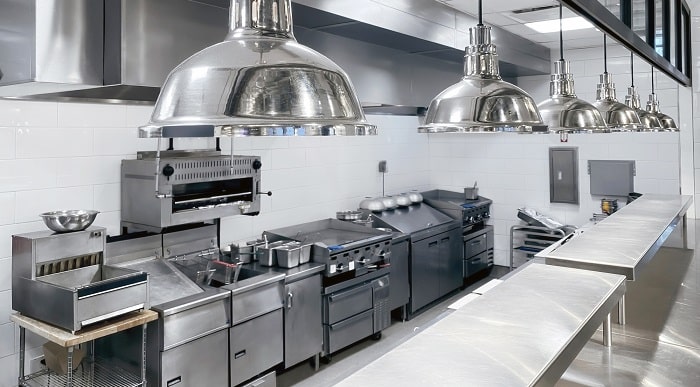
In the bustling world of the culinary industry, the quality of food is paramount. Behind every mouthwatering dish is a symphony of carefully chosen ingredients and expertly executed techniques. However, one often-underestimated factor plays a pivotal role in achieving consistent food quality in a commercial kitchen: the equipment used. From stovetops to ovens, refrigerators to blenders, every piece of commercial kitchen equipment can significantly influence the taste, texture, and overall appeal of the final product. In this article, we delve into the profound impact that commercial kitchen equipment has on food quality.
Precision Cooking: The Heart of Consistency
Consistency is the holy grail of any successful restaurant or food establishment. Commercial kitchen equipment, designed with precision and advanced technology, helps chefs achieve consistency in cooking. Modern ovens are equipped with accurate temperature controls and even heat distribution, ensuring that every dish is cooked to perfection. This is especially crucial for baked goods, where slight temperature variations can lead to uneven rise and undesirable textures.
Efficiency Enhances Freshness
In the culinary world, time is of the essence. Commercial kitchen equipment is designed for efficiency, allowing chefs to prepare and serve dishes promptly. This efficiency not only improves customer satisfaction but also impacts food quality. For instance, high-speed blenders can process ingredients quickly, minimizing oxidation and preserving the vibrant colors and nutritional value of fruits and vegetables in smoothies and sauces.
Preservation of Nutrients and Flavor
Refrigeration and storage equipment are unsung heroes when it comes to maintaining food quality. Ingredients stored at the wrong temperature or in improper conditions can quickly deteriorate, leading to flavor loss and nutrient degradation. Commercial refrigerators and freezers are engineered to maintain optimal temperature and humidity levels, extending the shelf life of perishable items and locking in their nutritional value and flavor.
Innovations in Texture and Presentation
The texture of a dish can be as important as its taste. Commercial kitchen equipment allows chefs to experiment with various textures, opening the door to culinary innovation. Sous vide machines, for example, enable precise temperature control for extended periods, resulting in meats that are incredibly tender and evenly cooked. Additionally, specialized equipment like immersion circulators can help create unique textures in dishes by controlling the consistency of liquids such as custards and sauces.
Versatility Fuels Creativity
Modern commercial kitchen equipment offers a level of versatility that empowers chefs to explore their creativity. From combi ovens that can steam, bake, and roast to multi-functional food processors, these tools expand the possibilities of what can be achieved in the kitchen. This versatility enables chefs to experiment with different techniques and ingredients, ultimately elevating the taste and presentation of their creations.
Hygiene and Safety: Non-Negotiable Factors
Food quality isn’t solely about taste and texture; it also encompasses hygiene and safety. Commercial kitchen equipment is designed with sanitation in mind. Stainless steel surfaces, for example, not only resist corrosion but also facilitate thorough cleaning, preventing cross-contamination. Additionally, modern fryers are equipped with features like automatic oil filtration, ensuring that the oil remains clean and free from impurities that could affect the flavor and quality of fried foods.
Meeting the Volume Demand
In the world of commercial dining, the demand for food can be immense. Without efficient and reliable equipment, maintaining food quality at scale would be an insurmountable challenge. Industrial-grade mixers, grills, and fryers are built to handle high volumes while consistently delivering the desired results. This ability to meet volume demand without compromising quality is a defining characteristic of effective commercial kitchen equipment.
Investment for Long-Term Success
While the initial cost of high-quality commercial kitchen equipment might seem substantial, it’s essential to view it as an investment in the long-term success of the establishment. Reliable equipment reduces downtime, lowers maintenance costs, and ensures that food quality remains consistent. Customers who enjoy their dining experience are more likely to become repeat patrons, contributing to the restaurant’s reputation and profitability.
The Future of Culinary Excellence
As technology continues to advance, the future of commercial kitchen equipment holds even more promise. From energy-efficient appliances to intelligent cooking systems, innovation is driving the industry forward. Chefs and foodservice professionals have an exciting opportunity to leverage these advancements to further enhance food quality, delighting palates and shaping the culinary landscape for years to come.
In Conclusion
The impact of commercial kitchen equipment on food quality for health cannot be overstated. Precision cooking, efficiency, preservation of nutrients, texture experimentation, versatility, hygiene, and meeting volume demands are all facets of how equipment influences the culinary outcome. Chefs who recognize the significance of their tools in shaping the dining experience are poised to create memorable dishes that resonate with their customers, building a loyal following and setting new standards of excellence in the ever-evolving world of gastronomy.